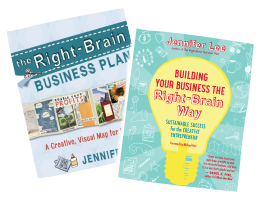
Guest post by Cass Mullane, Creative Innovator, Right-Brain Business Plan® Licensed Facilitator, Prosper Creatively, LLC
How are you at dealing with distractions? Do you find your day slipping away because of distractions? On the other hand, perhaps you’re pretty good at managing your time and your attention. Either way, you need to have a few simple techniques in your bag in order to handle the barrage of distractions that you encounter each day.
Distractions fall into two broad categories: self-created and externally created. They can be productive or they can wreak havoc with your ability to get things done. Your job is to have the discipline to choose your distractions and your reactions wisely.
Self-created distractions abound. These are the games you play on your computer, the videos you watch, the social media you check, the wandering, the idle chatter, the breaks for beverages and snacks, the books and magazines, the shopping, day dreaming, whatever you choose to do that uses up your time.
As for externally created distractions, they can include the ping of your phone, an unexpected visitor, meetings, news, rumors and gossip, traffic or the weather. These are distractions that you have no control over, they just happen.
Remember, not all distractions are bad, they are just distractions. While you may not be able to control the arrival of a distraction, you certainly can control your reaction to it and how you deal with it.
Let’s look at games on the computer. This is a self-created distraction that people generally associate with wasting time. One sure fire technique you can use to sensitize yourself to how much time you actually spend on games is to physically track the amount of time you are playing online. When you add it up, it can be shocking. Then, when you look at the pile of work not yet completed, it may be just the kick in the pants that you need to start making a better choice on where to spend your precious time. If you’re not ready to cut out games all together, an effective technique to manage your games is a using a timer. Set the timer and when it goes off you stop and close the game. Period.
But not all distractions involving games are bad. For example, I do some of my best creative business thinking while I’m putting together an online jigsaw puzzle. This is a productive self-created distraction as it frees up one part of my brain to work on the problem while another part is busy doing the puzzle. When I’m done letting my mind work something out, I simply close the puzzle tab so I’m not tempted. Out of sight, out of mind.
Externally created distractions are everywhere, especially in our digital age. Just think about what happens when you hear the phone or laptop ping… you drop everything to check it. Obviously there are times when you need to be on top of a situation, but most of the time the pings are extraneous and they can wait.
Think you’re immune? Probably not. When you see an email notification pop on your screen your eyes are naturally drawn to the movement. You automatically look at it for a moment. The result is a distraction from whatever it was that you were looking at before. The same is true with any notification like an instant message, a Facebook post, an Instagram pic, a tweet, a video, a sound byte, a podcast upload, a blog post… you get the picture.
But who is in charge here? Do those online services decide how you will spend your day or do you decide when you check those services?
One technique you can use to help resolve this problem is to turn off your notifications. You’ll be amazed at how much more you can get done in one uninterrupted hour. After all, your devices are just tools and you’re in charge of how you use your tools.
Dealing with distractions can be as easy as implementing a few simple techniques like setting a timer or closing a tab. All it requires is knowing the technique and having the discipline to use it.
 Like many great innovators, Cass Mullane has the unique combination of being a strong creative as well as a strategic thinking MBA. After departing the corporate world in 2004, Cass built a thriving business and personal coaching practice that focuses on accountability and specializes in solid business skills for right brainers and creatives. Tapping into this whole brain approach has helped to make Cass a highly valued coach with an international clientele.
Like many great innovators, Cass Mullane has the unique combination of being a strong creative as well as a strategic thinking MBA. After departing the corporate world in 2004, Cass built a thriving business and personal coaching practice that focuses on accountability and specializes in solid business skills for right brainers and creatives. Tapping into this whole brain approach has helped to make Cass a highly valued coach with an international clientele.
Cass’ new #1 International Bestseller, The Cool Stuff Jar: Three Simple Ways to Live a Happier Life, is now out on Kindle! Keep tabs on the book launch and all the fun following the launch by visiting www.CoolStuffJar.com and entering your email. You can also follow Cass on Facebook!








